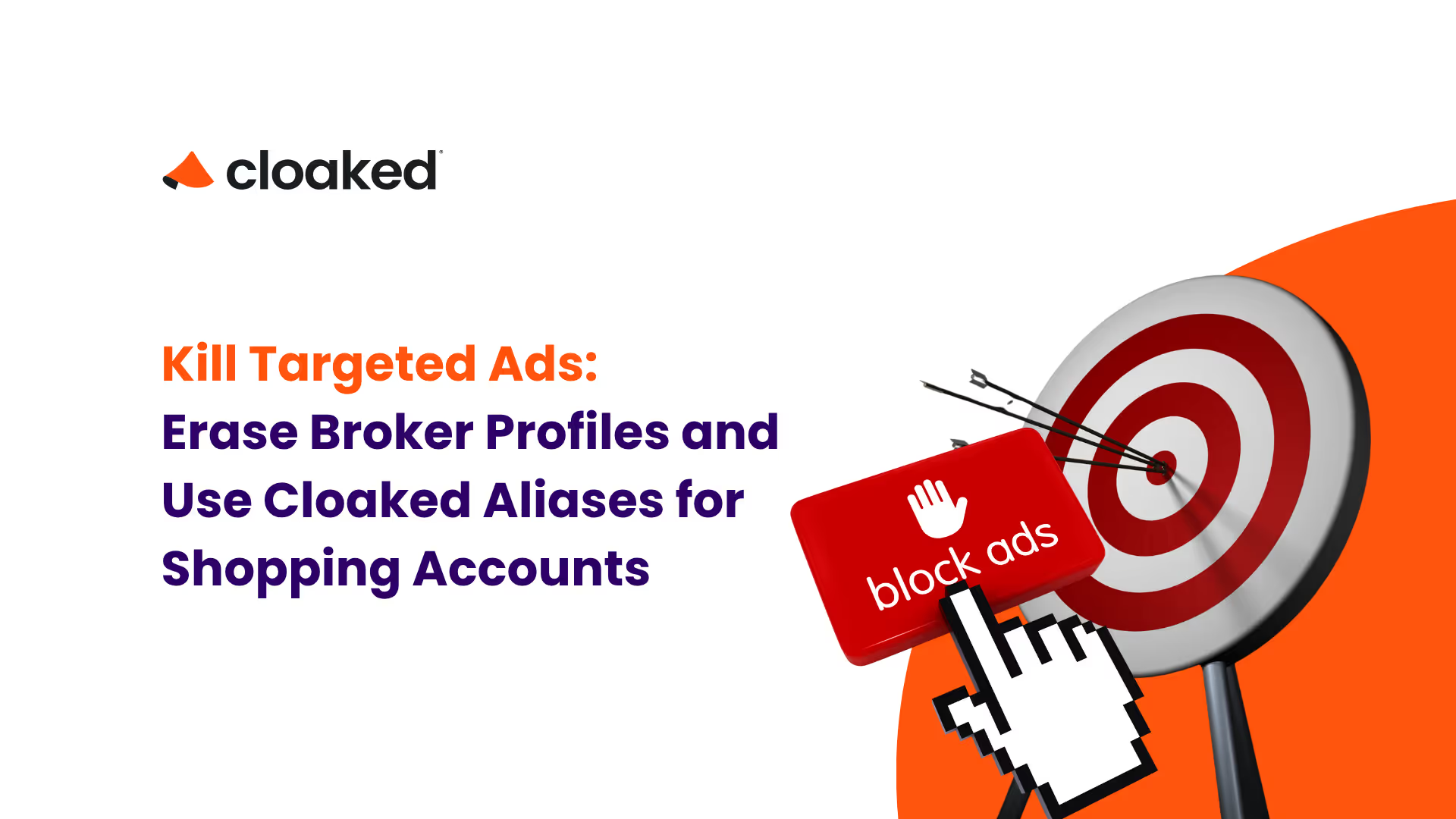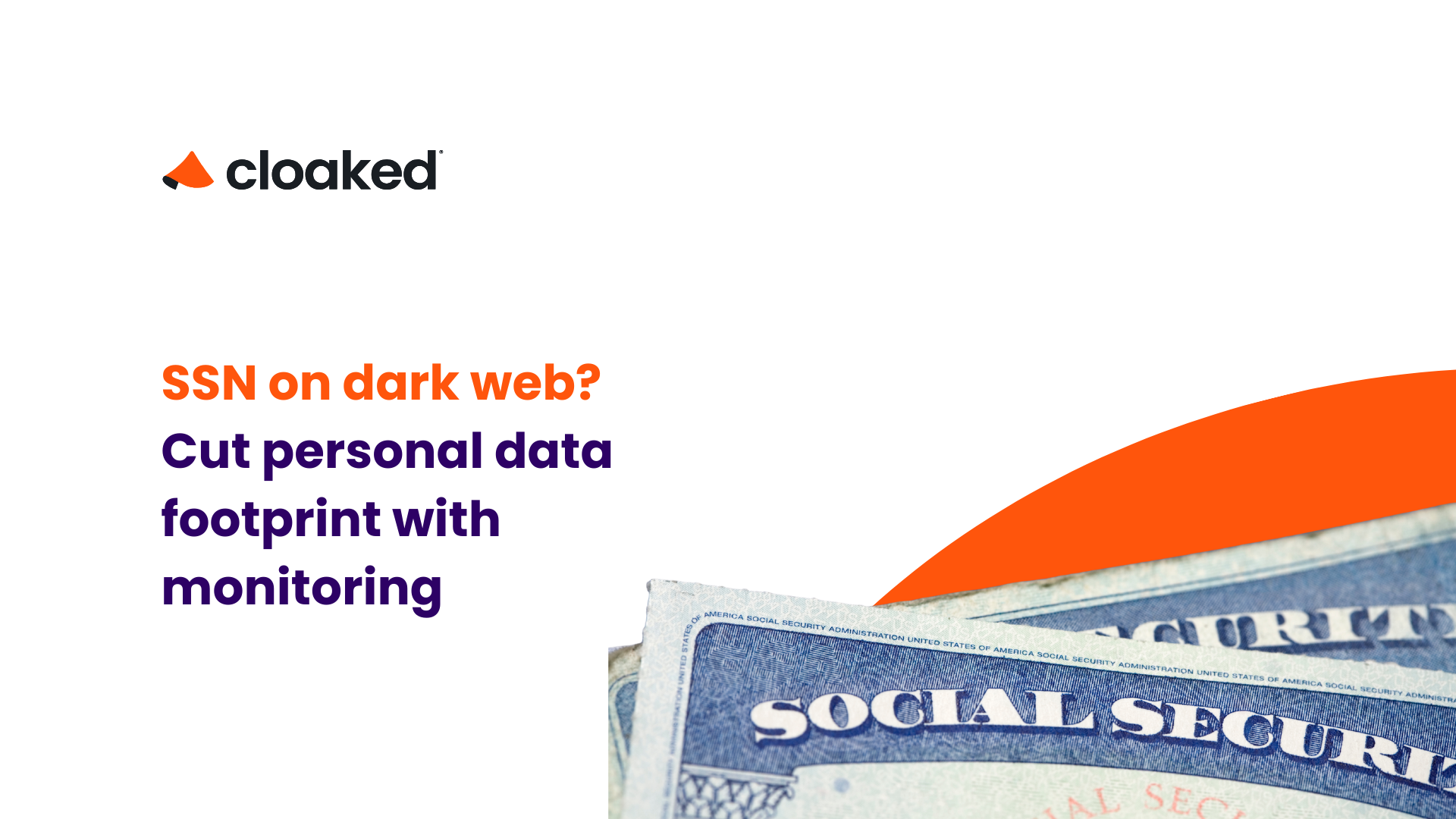Targeted ads feel inescapable, but you can stop targeted ads by cutting off the data brokers that feed them. This post explains the broker-ad loop and walks you through deleting broker files, then masking new activity with Cloaked aliases.
Why Targeted Ads Follow You Everywhere
Every click, purchase, and website visit feeds into a vast advertising machine that seems to know you better than you know yourself. This isn't magic--it's behavioral targeting, a marketing technique that delivers tailored advertising based on your online behaviors.
The scale is staggering. "By 2023, roughly 81% of worldwide digital ad spend was transacted programmatically," creating an automated marketplace where your personal data becomes currency. At the center of this ecosystem sits OnAudience.com with over 50 billion user profiles, exemplifying how data brokers power the ads that follow you across every device and platform.
What makes this system particularly invasive is that less than 1 percent of Californians have exercised their rights with major data brokers in 2023. This means the vast majority of consumers remain trapped in endless tracking loops, their every digital move converted into advertising fodder.
How Data Brokers Build Behavioral Profiles
Data brokers operate as the invisible backbone of targeted advertising, collecting and selling personal information from public records, online activities, and commercial sources. These companies create comprehensive dossiers that include everything from your browsing history to your income levels, all without your explicit consent.
The financial scale reveals just how valuable your data has become. The data broker industry generated "$250 billion in 2022" and is projected to reach $561.538 billion by 2029. This explosive growth comes from their ability to package your personal details into products advertisers desperately want.
The targeting capabilities have become frighteningly precise. Safari's CPMs are 47% lower than Chrome's specifically because Safari blocks third-party cookies, limiting ad targeting. This price difference shows exactly how much advertisers value the ability to track you across websites. Meanwhile, platforms are willing to pay premium rates for hyper-targeted inventory, with ad spend reaching $996 million across just 100 consumer brands on Google Ads alone.
Step 1 – Delete Your Broker Data for a Clean Slate
Breaking free from targeted ads starts with erasing the profiles data brokers have already built about you. The good news is that starting in 2026, Californians will be able to delete all the data a broker collects about them in one step through the California Delete Act.
But you don't have to wait. The California Delete Act already requires brokers to establish an accessible deletion mechanism by January 1, 2026, where consumers can submit a single verifiable request to delete their personal information across all registered data brokers. This centralized system will revolutionize privacy protection.
For immediate action, services like Cloaked can remove your personal info from 120+ data brokers and other sites right now. This comprehensive approach saves you from individually contacting hundreds of brokers, each with their own complex opt-out processes. Whether you choose to wait for California's DROP portal or take action today through data removal services, the key is starting the deletion process to stop feeding the ad-targeting machine.
Step 2 – Use Cloaked Email, Phone & Payment Aliases
Deleting existing broker data is only half the battle. To stay private, you need to prevent new data collection. "With Cloaked, you can create unique identities composed of fabricated information, including a fake email and phone number" for every online interaction.
This alias strategy works because it breaks the fundamental connection advertisers rely on. Whitehat cloaking is strategic--you show a safe version of your identity to data collectors while keeping your real information private. Each retailer, newsletter, or service gets its own unique identifier that can't be cross-referenced.
The practice has proven so effective that link cloaking transforms long, messy URLs into cleaner, branded alternatives, making it harder for trackers to follow your digital footprint. By compartmentalizing your online presence through aliases, you ensure that even if one identity gets compromised or sold, it can't be linked back to your other accounts or your real identity.
Holiday Shopping Privacy Checklist
Black Friday and Cyber Monday create a data feeding frenzy for brokers and advertisers. In 2024, hackers stole nearly 2.9 billion records from just one data broker, showing how vulnerable your shopping data becomes during peak retail seasons.
Before you start shopping, follow this privacy checklist:
1. Create dedicated shopping aliases: Generate unique emails for each retailer using Cloaked
2. Use masked phone numbers: Provide alternative phone numbers instead of your real one
3. Set up virtual payment cards: Use masked payment options for purchases
4. Delete old accounts: Remove profiles from retailers you no longer shop with
5. Enable dark web monitoring: Dark web alerts provide immediate notifications when your data appears in breach databases
"On June 5, 2024, a staggering 122 GB of data was scraped from thousands of Telegram channels, revealing 1,748 files with 361 million unique email addresses." This massive exposure shows why using unique identities for each shopping account isn't paranoid--it's essential protection against the inevitable breaches that follow major shopping events.
Stay Private Long-Term: Monitoring & New Laws to Watch
Maintaining privacy requires ongoing vigilance and staying informed about evolving regulations. The California Delete Act represents a major shift, with brokers required to use the deletion platform at least every 45 days starting August 1, 2026 to process consumer deletion requests.
The regulatory landscape is tightening rapidly. California consumers must be able to access the DROP portal by January 1, 2026, and data brokers will be required to check it every 45 days thereafter. Non-compliance carries serious consequences, with penalties of $200 per day for brokers who fail to register or honor deletion requests.
Looking ahead, by January 1, 2028, data brokers must undergo independent third-party audits for compliance. These increasing requirements signal a fundamental shift in how personal data can be collected and sold, making it easier than ever to maintain your privacy long-term.
Take Back Control of Your Digital Footprint
Breaking the targeted ad loop isn't a one-time fix--it's an ongoing commitment to protecting your digital identity. By combining broker data deletion with unique aliases for every online interaction, you create a privacy shield that advertisers can't penetrate.
Cloaked helps you secure your data once you've removed it from broker databases, offering a complete privacy ecosystem that includes data removal from 120+ brokers, unlimited secure aliases, and $1 million in identity theft insurance. The combination of removing existing data and preventing new collection through aliases makes you invisible to the ad-targeting machine.
The tools and laws are finally catching up to give consumers real control. Whether you start today with a data removal service or wait for California's DROP portal in 2026, the important thing is taking that first step. Your digital footprint doesn't have to be a permanent record for advertisers to exploit. With the right approach, you can shop, browse, and live online without becoming another data point in someone else's marketing campaign.










